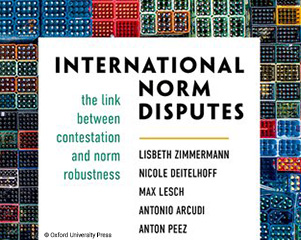International norms, institutions, and the international order itself are increasingly under challenge in virtually every policy area – from human rights and global health, through trade and climate change, to arms control and international peace and security law. International relations scholars have begun to study the effects of norm contestation, backlash against institutions and courts, and the broader crisis of the liberal international order. Whether contestation weakens or even strengthens international norms has inspired a lively debate in international relations and international law. Does contestation always intrinsically weaken norms, or is contestation itself a normative force that reinforces norms in their validity through continuous actualization?
In their newly released monograph “International Norm Disputes: The Link between Contestation and Norm Robustness” Lisbeth Zimmermann, Nicole Deitelhoff, Max Lesch, Antonio Arcudi, and Anton Peez explore how the dispute over international norms affects their validity. The book compares four contemporary cases of contested norms – the torture prohibition, the responsibility to protect, the moratorium on commercial whaling, and the duty to prosecute institutionalized in the International Criminal Court – and two historical cases – privateering and the transatlantic slave trade.
The book is the result of the project “Norm Disputes: Contestation and Norm Robustness”, which was funded by the German Research Foundation (DFG).
